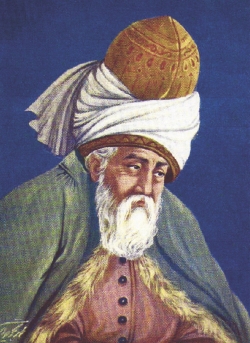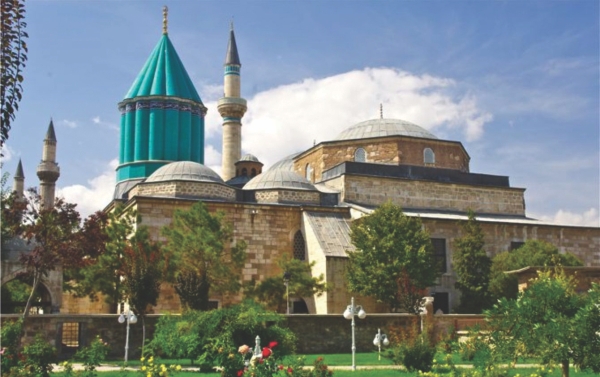| Home - Back Issues - The Team - Contact Us |
 |
| Volume 10 |Issue 38 | October 07, 2011 | |
|
|
History Mystic, Sufi and Poet Jelaluddin Rumi Azizul Jalil “I am like a bird from another continent, sitting in this aviary.
It is with considerable trepidation that I write about the thirteenth century poet, Rumi (1207-73). Reading the excellent book in Bangla, “Rumir Aloukik Bagan”, by Mustafa Zaman Abbasi, English translations of selected poems by Rumi- “The Essential Rumi” and “Rumi-The Glance” by Coleman Barks, “The Forbidden Rumi” by Ergin and Johnson and “Rumi” by Franklin Lewis has given me only a brief introduction to the beautiful world of Rumi's poetry. The best known of Rumi's work is his marvellous six volume poem – the Mathnawj. His poems comprise of forty-four thousand verses, which was organised later into twenty-three volumes called the Diwan-i-Kebir. This essay is an audacious attempt on my part to provide a glimpse of the mysterious, often confusing, poetry of Rumi. The readers may then try to swim in the ocean of Rumi's thoughts. Rumi was born in 1207 in Balkh in Afghanistan, which was then a part of the Persian Empire. His family moved to Konya in Turkey due to the threat of the advancing Mongol army. His father, Bahuddin Walad, was a theologian and jurist. After his father's death, Rumi took over the position of sheikh in the dervish community of Konya. He died in 1273. In the conventional sense, Rumi himself never 'wrote' a line. He went around –singing, dancing and verbally composing sonnets or quatrains. No wonder he was called 'a dancing dervish'. Fortunately for mankind, his followers wrote down the words uttered by him, which preserved for posterity the world of his poetry and thoughts. He never changed or edited a word of what he had said – be it a story or a poem. He let these stand as it came out of him spontaneously – the first expression became the final poem. As a result, often his poems read like prose without rhyme. To the western world, Rumi is a late discovery. Now, he is one of the most-read poets in USA. What is the essence of Rumi's thought? I searched for an answer in the few books I was able to consult. I got the sense that it is the annihilation of the self to get to the soul. It is a constant struggle and only the most devoted in this pursuit is able to break out of the shell to reach truth and unity with God. At that point, the individual and God are the same. The Sufis call this the consciousness of union, an antidote to the alienation – the more common consciousness of separation. Rumi wrote: “Unless one is completely annihilated
There is an anecdote that Rumi narrates. It is about a poor dervish, named Bayezid Bistami, who lived in a hut and meditated all by himself. A merchant was passing by with camels and provisions on his way to pilgrimage in Mecca. He had 200 silver coins sewn in his clothes for providing charity there. He had heard that by going round the Kaaba seven times, one could see God. The merchant stopped to see the dervish and narrated the purpose of his long journey. Bayezid told the merchant that he could spare himself all the troubles of the journey by going round his hut seven times and donating his coins to a charity closer to home. He would be able to see God, as He was everywhere and possibly within the soul of the merchant himself. The latter followed the advice, made the rounds and at the end fell to the ground in a trance. All his silver coins fell out of his clothes on the ground. In his poem 'The Journey Starts Here”, Rumi says: “You are the world. This is the central theme that pervades all Rumi's poetry – oneness with God and struggling to break out of one's shell and be in complete union with Him. It can be found in all Sufi poets and philosophers from the times of Rumi, Hafiz and Omar Khayyam to that of Lalon and Tagore. Rumi tells the story of one Nasiruddin who walks the town aimlessly. It's 4am A policeman stops him and asks: “Why are you out wondering the streets in the middle of the night? Nasiruddin replies “Sir, if I knew the answer to that question, I would have been home hours ago!” In 1284, Ahmeddin Kaysar, a Turkish Government official, said about Rumi: “Every Prophet was praised by the people of the same religion. Every master was loved by his disciples. But he is loved and respected by all nations and religions.” Nevitt Ergin in his book “the Forbidden Rumi,” considered the fact that he is loved around the world as Rumi's miracle in the thirteenth century, still holds true in the twenty-first century.
Copyright
(R) thedailystar.net 2011 |

